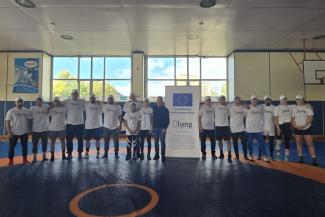Sushil Snags Third Commonwealth Games Gold, Wiebe Wins Second
Thursday, April 12, 2018 - 12:11 By Eric Olanowski

GOLD COAST, Australia (April 12) - Olympic gold medalist Erica WIEBE (CAN) and two-time Olympic medalist Kumar SUSHIL (IND) capped off day one at the Commonwealth Games with yet another gold medal. For Wiebe, this is her second time grabbing gold while this is Sushil's third championships performance.
In the final bout at 76kg, Wiebe found herself fighting back after Blessing Joy ONYEBUCHI (NGR) struck first to take the early 2-0 lead. But it was Wiebe who remained disciplined and used an arm spin to put Onyebuchi on her back, picking up the first-period fall.
At 74kg, 34-year-old Kumar Sushil made quick work of Johannes Petrus BOTHA (RSA). He started the match off double legging Botha to his back for four. After three gut-wrenches, Sushil was awarded his third Commonwealth Games gold medal.
The first bronze-medal bout at 74kg saw Ebimienfaghe ASSIZECOURT (NGR) take the 8-0 lead over Curtis DODGE (WAL) after a takedown and three turns off a trapped arm gut. Dodge, the former Judo player remained composed and used a Judo throw to pick up a fall shortly after the start of the second period. This was Dodge's first Commonwealth Games wrestling medal.
In the second bronze-medal match, Connor EVANS (AUS) picked up the first takedown, but Jevon BALFOUR (CAN) went on an 8-2 run to end the first period. At one point during the first period, Balfour was in on a single leg when Evans tried a backflip only to land directly on his head, giving Balfour four points. Balfour’s two additional takedowns in the second period secured his bronze medal as he beat Evans, 14-4.
The 57kg final was a battle of two-time world team representatives in Steven TAKAHASHI (CAN) and Rahul AWARE (IND).
Aware took the first points with a takedown, but that was followed by a four-point throw from Takahashi, giving him the 4-2 lead. Aware ended the first period on a 4-0 run and took the 6-4 lead.
In period two, it was Aware who opened the match up, outscoring Takahashi 9-3, ultimately giving him the 15-7 victory in the gold-medal bout.
The first bronze-medal bout at 57kg was a rematch of the African championships gold-medal match where Jan Louwrens COMBRINCK (RSA) defeated Ebikewenimo WELSON (NGR). Welson's two takedowns were enough to scoop up his third Commonwealth Games medal and avenge his loss from earlier in the year.
Muhammad BILAL (PAK) used three takedowns to beat George Anthony RAMM (ENG), 6-1 in the second bronze medal bout at 57kg.
In the 53kg ‘Nordic tournament’ gold-medal match, Diana Helen WEICKER (CAN) took the 1-0 lead after returning champion Kumari BABITA (IND) failed to score while being placed on the activity clock. After a two-and-two exchange and a chest wrap, Weicker was victorious by a score of 5-2. Weicker, the mother of two outscored her opponents 36-2 on her way to her first Commonwealth Games championship.
Freestyle
57kg
GOLD - Rahul AWARE (IND) df. Steven TAKAHASHI (CAN), 15-7.
BRONZE - Muhammad BILAL (PAK) df. George Anthony RAMM (ENG), 6-1.
BRONZE - Ebikewenimo WELSON (NGR) df. Jan Louwrens COMBRINCK (RSA), 5-2.
74kg
GOLD - Kumar SUSHIL (IND) df. Johannes Petrus BOTHA (RSA), 10-0.
BRONZE - Jevon BALFOUR (CAN) df.. Connor EVANS (AUS), 14-4
BRONZE - Curtis DODGE (WAL) df. Ebimienfaghe ASSIZECOURT (NGR), via fall.
Women’s Wrestling
53kg - Nordic Tournament - Only one bronze
GOLD - Diana Helen WEICKER (CAN) df. Kumari BABITA (IND), 5-2.
BRONZE - Bose SAMUEL (NGR) df. Deepika WEERABAHU MUDIYANSELAGE (SRI), via fall.
76kg
GOLD - Erica Elizabeth WIEBE (CAN) vs. Blessing Joy ONYEBUCHI (NGR), via fall.
BRONZE - Kiran KIRAN (IND) df. Katouskia PARIADHAVEN (MRI), via fall.
BRONZE - Georgina NELTHORPE (ENG) df. Hajaratu KAMARA (SLE), via fall.
SCHEDULE
April 13 (10:30am LOCAL TIME)
Freestyle - 65kg and 97kg
Women's Wrestling - 57kg and 68kg
April 14 (10:30am LOCAL TIME)
Freestyle - 86kg and 125kg
Women's Wrestling - 50kg and 62kg


Share your thoughts.
Comments